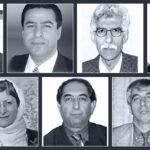On Wednesday night I attended an annual human rights event which I hope I never have to attend again. It marked yet another year during which Iran’s authorities have trampled on the human rights of its own people. The event in Sydney highlighted the unjust imprisonment of the seven leaders of Iran’s Baha’i community. Every year the anniversary of the unjust imprisonment of … [Read more...] about Enough! Australian Lawyers Call on Iran to Release Baha’i Seven
human-rights
Refugees: Custodians of a Nation’s History
The people we share a train carriage with on the way to work, the hundreds we pass in a busy shopping centre, all these people carry a story within them. Each story is changing, developing and interlinked with others. Each story is a multi-faceted tile that helps to build the complex, mosaic of human life on this planet. Fortunately for us Brisbane resident, Manijeh Saatchi, … [Read more...] about Refugees: Custodians of a Nation’s History
The Prison Poet is Heard
I write if only to stir faint memories of flight in these wing-bound birds, to open the cage of the heart for a moment trapped without words. For how can one not faint for these women, beaten so brutally? How can one not fear for them, suffering such tyrannical cruelty. Mahvash Sabet, ‘The Perfume of Poetry’, Prison Poems, p. 32 A woman sits in her prison cell in Iran, poetry … [Read more...] about The Prison Poet is Heard
The Destruction of Memory
The rebels had fled, but before they left they had destroyed a precious archive. The world gasped in dismay as the mayor of Timbuktu announced that a library recently built to hold Timbuktu’s historic manuscripts had burnt to the ground. At the time the Mayor did not know that while some historic manuscripts were now a pile of ashes, most had been saved. Yet these manuscripts … [Read more...] about The Destruction of Memory
“No-one can ban me from learning”
Imagine that you, and all those who are like you, are forbidden by the government to undertake further education after finishing school. Perhaps you did well at school, but once your identity became known to your teachers they told you that it was a shame - why don't you change? You see your friends go onto university - some with school results that were not as good as … [Read more...] about “No-one can ban me from learning”
